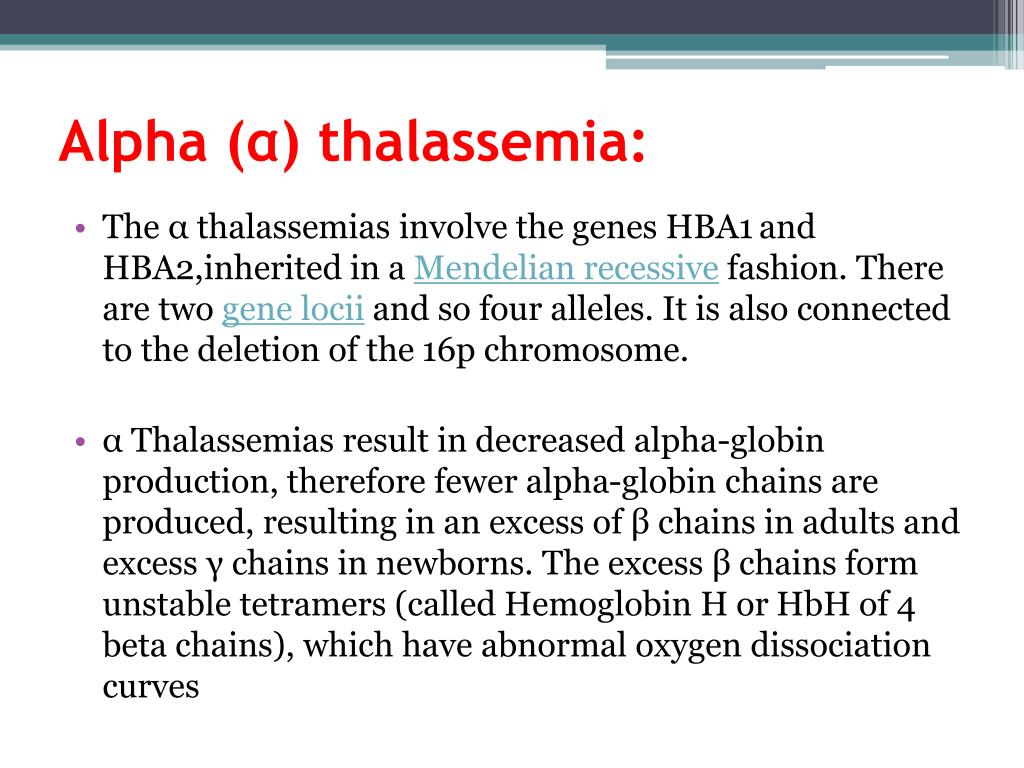

Tips to help you get the most from a visit to your healthcare provider: People who have this condition can pass the disease on to their children. This condition causes mild to severe anemia, based on the type of alpha thalassemia that is inherited. There are 4 different types of alpha thalassemia. It causes the body to make less hemoglobin than normal. Thalassemia is an inherited blood disorder. They can help you find the best treatment to reduce anemia symptoms. If you have symptoms, work with your healthcare provider. They can help you understand the risks of passing the disease to your children. If you don’t have symptoms, you may still want to see a specialist. People with alpha thalassemia may have no symptoms. Not using certain oxidant medicines in hemoglobin H disease Medicines to reduce extra iron from your body (called iron chelation therapy) It will also depend on how severe the condition is. Treatment will depend on your symptoms, age, and general health. In a pregnant woman, the baby is diagnosed using CVS (chorionic villus sampling) or amniocentesis. A DNA test is needed to make a diagnosis of alpha thalassemia. This test identifies which alpha-globin genes are present, absent, or damaged.Īll of these tests can be done using a single blood sample. This test is done to rule out iron-deficiency anemia.ĭNA testing. A lab test that tells what type of hemoglobin is present.įerritin. This test checks the size, number, and maturity of different blood cells in a set volume of blood. The following blood tests are done to check for the condition and to tell if you are a carrier and can pass the disorder on to your children:Ĭomplete blood count (CBC). Babies with this type often die before they are born.Īlpha thalassemia is most often found in these parts of the world: You have a greater risk of having a child with the most severe type, alpha thalassemia major.Īlpha thalassemia major. You may also have an enlarged liver or spleen, yellowish skin, and leg ulcers. These include fatigue and exercise intolerance. This type causes moderate to severe symptoms. Or you may have mild symptoms such as mild fatigue or trouble doing normal amounts of physical activity (exercise intolerance). This type has no symptoms.Īlpha thalassemia carrier. Common symptoms for each type may include: What are the symptoms of alpha thalassemia?ĭifferent people will have different symptoms based on which type of alpha thalassemia is inherited. The only risk factor is having a family history of the disease. This is a genetic disease inherited from one or both parents. In most cases, a baby with this condition will die before birth. Blood transfusions are often needed. You have a greater risk of having a child with alpha thalassemia major.Īlpha thalassemia major. They can also get worse if you are exposed to certain medicines, chemicals, or infectious agents. Hemoglobin H disease. Three genes are missing. This is confirmed by DNA tests.Īlpha thalassemia carrier. Being a silent carrier means you don’t have signs of the disease, but you can pass the damaged gene on to your child. Your red blood cells may be smaller than normal. One gene is missing or damaged, and the other 3 are normal. Thal-uh-SEE-mee-uh What causes alpha thalassemia?Īlpha thalassemia occurs when one or more of the 4 alpha-globin genes that make up part of the hemoglobin molecule are missing or damaged.Īlpha thalassemia silent carrier. The severity and type of anemia depends on how many genes are affected. Anemia occurs when your body does not have enough red blood cells or hemoglobin. Thalassemia can cause mild or severe anemia. Different genes are affected for each type. There are two main types of thalassemia: alpha and beta. It carries oxygen to all parts of the body. Hemoglobin is an iron-rich protein in red blood cells. When you have thalassemia, your body makes less hemoglobin than normal.

This means it is passed down from one or both parents through their genes. Thalassemia is a blood disorder that is inherited. Billing, Insurance & Financial AssistanceĪlpha Thalassemia What is alpha thalassemia?.


 0 kommentar(er)
0 kommentar(er)
